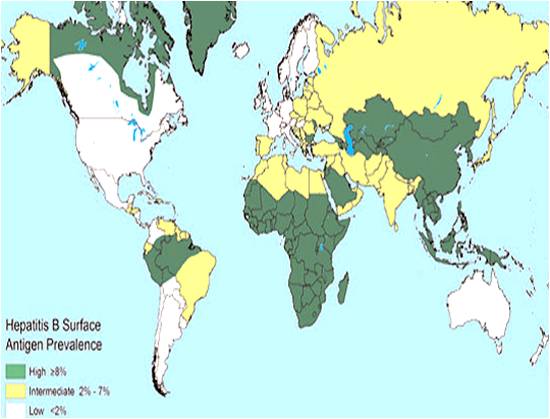What is Hepatitis B?
The Hepatitis B Virus may or may not cause symptoms. Following infection, 5-10% of infected adults and up to 90% of children develop the persistent infection called chronic hepatitis B. Many people with chronic hepatitis B remain well, but some over 20 or more years, develop serious liver problems. The virus is mainly passed on via infected blood contacting wounds, this can happen in many ways, at birth or in childhood when the immune system is weak and wounds so common, via fighting or sharing razors, from forgetting plasters, from working with blood as a cleaner or doctor, across Africa and Asia a huge risk for millions and millions was from contaminated healthcare vaccine gun usage. High load carriers of Hepatitis B can be infectious during sexual contact also, the Virus can cause serious Liver Disease.
What does Hepatitis B do?
Hepatitis B is a virus which is carried in the bloodstream to the liver. It can then affect and damage your liver, if left undiagnosed for decades to middle age and old age it can cause cirrhosis and liver cancer. There are excellent anti viral medications such as Tenofovir that can completely control hepatitis b now, for about 70% of the infected the virus the virus is inactive having little effect and is controlled by avoiding alcohol, paracetamol and becoming fat.
How common is Hepatitis B?
Worldwide, it is also very common infecting 1 in 4 humans passingly and 1 in 25 lastingly.
For example, in most of Asia more than 1 in 30 people have chronic hepatitis B infection and 1 in 3 humans catch it! In Africa there is a great deal of Hepatitis B, sub Saharan nations are very effected with about 1 person in 20 having the Virus and 1 person in 2 catching it at some point. North African Mediterranean coast nations are less affected with about 1 person in 50 having the Virus and 1 person in 5 catching it at some point.

What are the symptoms?
In about 70% of cases symptoms are mild or unnoticed; in particular babies when infected usually have no symptoms. When they do occur symptoms usually happen between 8 and 16 weeks after infection and include: feeling sick, vomiting, abdominal pains, fever, weight loss and feeling generally unwell. You may become jaundiced (go 'yellow'). With jaundice due to hepatitis your pee goes dark and your poohs may go pale. Very rarely, about 1% of the time, a 'fulminant' hepatitis develops from these symptoms, which is life-threatening.
How does Hepatitis B progress?
New or Acute Infections. These occur for about six months when you are first infected and after which 95% of adults will clear the virus and become immune, babies up to 2 years old tend to 95% not clear the virus, children from 2 to 12 years old tend to have a 50% chance of clearing the virus and teenagers tend to have a 90% chance of clearing the Virus. Alcohol, antibiotics and lack of sleep all make clearing the Virus harder.
Lasting or Chronic Infections
If after 6 months the Virus is not cleared and our bodies do not create Hepatitis B Surface Antibodies, a lasting or chronic infection phase begins. Of those people who develop chronic hepatitis B infection and do not know and therefore may drink alcohol or get very fat or otherwise injure their livers.
Over 30 -50 years:
About 65% will stay well and live normal lives, usually the diagnosed early on.
About 35% will develop persistent liver inflammation (sometimes called active hepatitis B). Symptoms include: muscle aches, tiredness, feeling sick, lack of appetite, intolerance of alcohol, pains over the liver, jaundice and depression. Symptoms vary in severity and some people have liver inflammation without having any symptoms.
About 20% will develop cirrhosis. Cirrhosis is an extensive 'scarring' of the liver which can cause serious problems and 'liver failure' when it is severe. Cirrhosis usually takes many years to develop after being infected with hepatitis B
About 15% will die from liver cancer or liver failure after 30-50 years.
Ultimately Hepatitis B and C are both called silent killers as they can cause harm over decades without us knowing. Just as we need to test our sugar levels to avoid diabetes and cholesterol levels to avoid heart attacks, we need to check our hepatitis to avoid liver disease. With these diseases a simple test can often save our lives, it is always better to know!
